鲁教版初中英语中考二轮复习 专题十三 简单句和并列句课件(共16张PPT)
文档属性
| 名称 | 鲁教版初中英语中考二轮复习 专题十三 简单句和并列句课件(共16张PPT) | 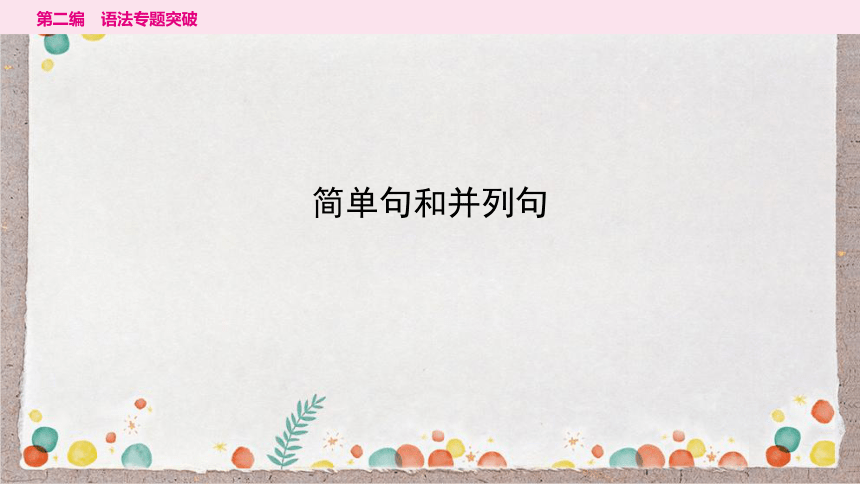 | |
| 格式 | pptx | ||
| 文件大小 | 1.2MB | ||
| 资源类型 | 教案 | ||
| 版本资源 | 鲁教版 | ||
| 科目 | 英语 | ||
| 更新时间 | 2023-12-28 20:38:12 | ||
图片预览

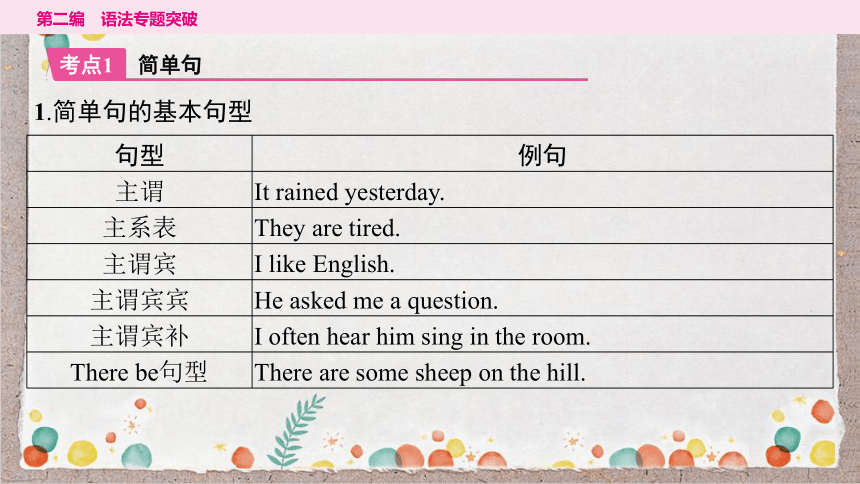
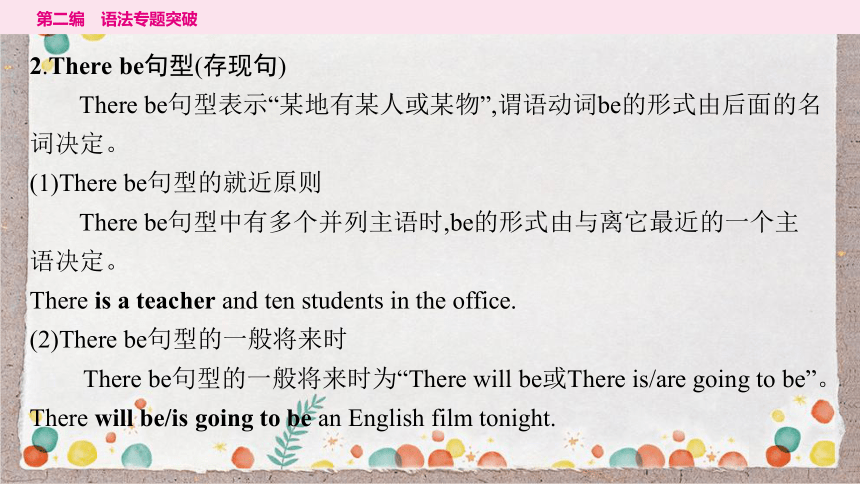
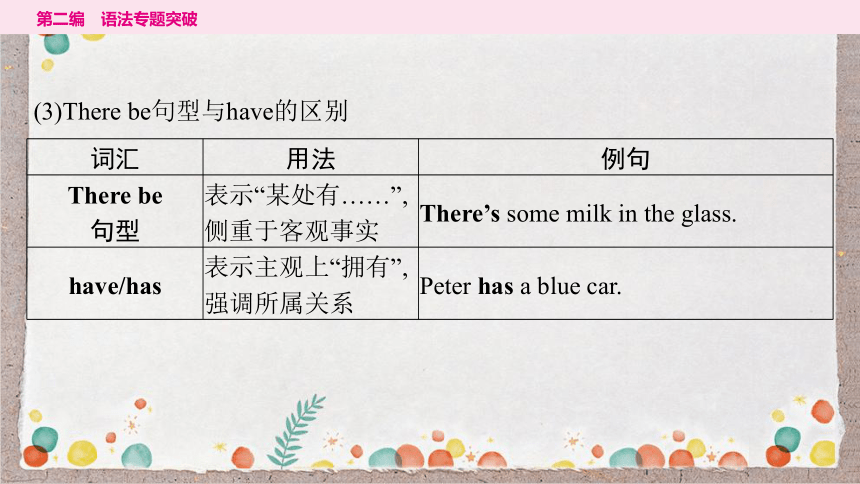
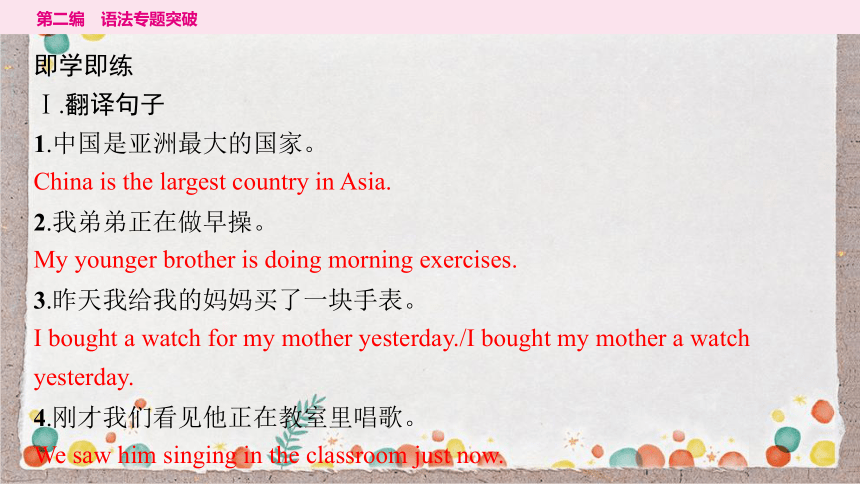
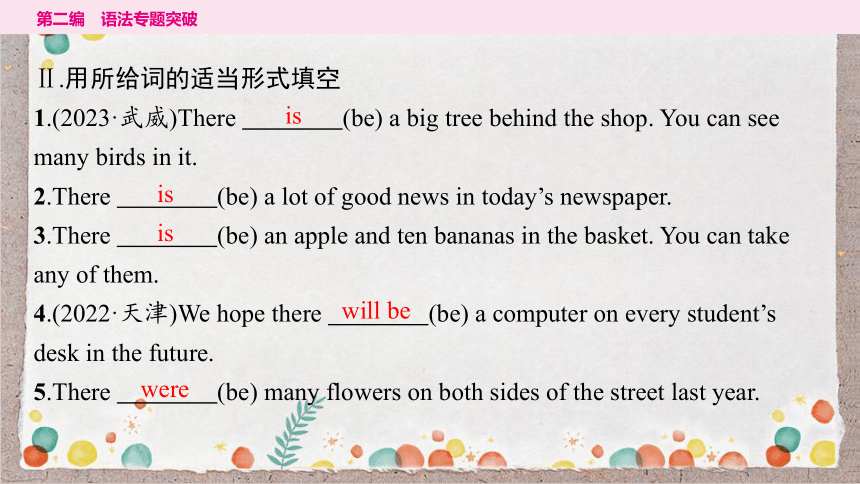
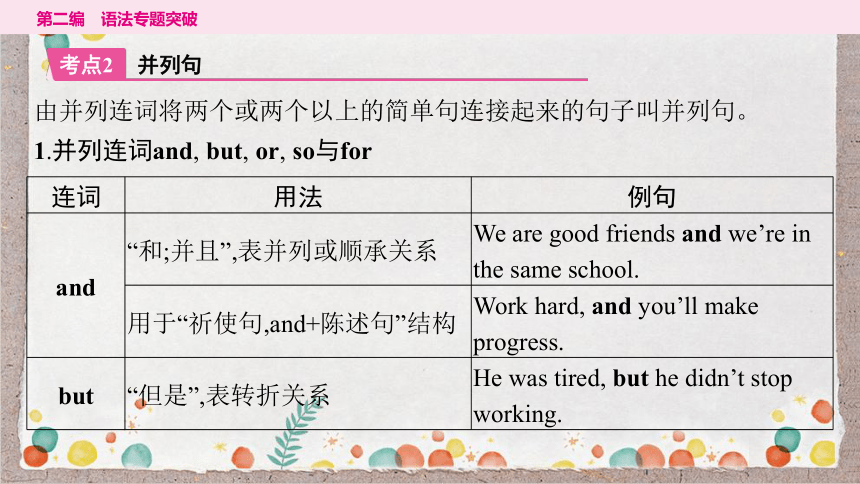
文档简介
(共16张PPT)
简单句和并列句
考点1
简单句
1.简单句的基本句型
句型 例句
主谓 It rained yesterday.
主系表 They are tired.
主谓宾 I like English.
主谓宾宾 He asked me a question.
主谓宾补 I often hear him sing in the room.
There be句型 There are some sheep on the hill.
2.There be句型(存现句)
There be句型表示“某地有某人或某物”,谓语动词be的形式由后面的名词决定。
(1)There be句型的就近原则
There be句型中有多个并列主语时,be的形式由与离它最近的一个主语决定。
There is a teacher and ten students in the office.
(2)There be句型的一般将来时
There be句型的一般将来时为“There will be或There is/are going to be”。
There will be/is going to be an English film tonight.
(3)There be句型与have的区别
词汇 用法 例句
There be 句型 表示“某处有……”,侧重于客观事实 There’s some milk in the glass.
have/has 表示主观上“拥有”,强调所属关系 Peter has a blue car.
即学即练
Ⅰ.翻译句子
1.中国是亚洲最大的国家。
2.我弟弟正在做早操。
3.昨天我给我的妈妈买了一块手表。
4.刚才我们看见他正在教室里唱歌。
China is the largest country in Asia.
My younger brother is doing morning exercises.
I bought a watch for my mother yesterday./I bought my mother a watch yesterday.
We saw him singing in the classroom just now.
Ⅱ.用所给词的适当形式填空
1.(2023·武威)There (be) a big tree behind the shop. You can see many birds in it.
2.There (be) a lot of good news in today’s newspaper.
3.There (be) an apple and ten bananas in the basket. You can take any of them.
4.(2022·天津)We hope there (be) a computer on every student’s desk in the future.
5.There (be) many flowers on both sides of the street last year.
is
is
is
will be
were
考点2
并列句
由并列连词将两个或两个以上的简单句连接起来的句子叫并列句。
1.并列连词and, but, or, so与for
连词 用法 例句
and “和;并且”,表并列或顺承关系 We are good friends and we’re in the same school.
用于“祈使句,and+陈述句”结构 Work hard, and you’ll make progress.
but “但是”,表转折关系 He was tired, but he didn’t stop working.
连词 用法 例句
or “或者”,表选择关系 Do you go to work by bus or by bike
“否则”,用于“祈使句,or+陈述句”结构 Hurry up, or you will be late.
so “所以”,表因果关系 He often tells a lie, so I don’t believe him.
for “因为”,表示原因,for前一般加逗号 We had better stay at home, for it is raining.
2.并列连词both...and..., neither...nor..., either...or...与not only...but also...
连词 含义 用法 例句
both... and... ……和 ……都 连接并列主语时,谓语动词用复数 Both you and I are students.
neither... nor... 既不…… 也不…… 连接并列主语时,谓语动词遵循就近原则 Neither he nor I have been there.
either... or... 或者…… 或者…… Either I or she cooks lunch at home.
not only... but also... 不仅…… 而且…… Not only I but also he likes Beijing Opera.
即学即练
选词填空
and, but, or, so
1.(2023·云南)He has failed many times, he never loses heart.
2.(2022·永州)Read more books, you will have something to write.
3.(2022·北京)Mr.Smith has helped me a lot, I’m thankful to him.
4.(2023·北京市朝阳区二模)We must do something to protect the earth,
we will lose our home.
but
and
so
or
either...or..., both...and..., neither...nor..., not only...but also...
5.Many tourists visit Hainan around the Spring Festival, because it’s
too cold too hot.
6. my parents Tom was invited to the party yesterday. They had a good time.
7. Sue Ann is going with you because one of them must help me with the housework.
8. my two brothers my father are able to drive a car. They can take turns to drive on such a long way.
neither
nor
Not only
but also
Either
or
Both
and
专题精练
Ⅰ.用适当的连词填空
1.(2023·扬州)Everyone will have to get out of their houses meet their neighbors.
2.(2023·河北)Hurry up, you will miss the beginning of the concert.
3.(2023·江西)Mary cut her knee badly, she didn’t cry.
4. Mary Helen live in the building. They are neighbors.
and
or
but
Both
and
5.(2023·绥化)—Could you tell me something about Yuan Longping
—Yes, he’s called the “Father of Hybrid Rice”. He helped to save __________
China the world from hunger.
6.—Lily, how do your parents like pop music
— my father my mother likes it. They both like classical music.
7.You can’t have them both. You can choose the bike the toy car.
both
and
Neither
nor
either
or
Ⅱ.翻译句子
1.昨天的报纸上有许多关于这个歌手的新闻。
2.桌子上有一个生日蛋糕和一些花。
3.下周我们的学校将有一场排球赛。
4.每天锻炼身体,你就会变得越来越强壮。
5.快点,否则我们将错过第一节课。
There was a lot of news about the singer in yesterday’s newspaper.
There is a birthday cake and some flowers on the table.
There will be a volleyball match in our school next week.
Take exercise every day, and you will be stronger and stronger.
Hurry up, or we will miss the first lesson.
6.昨天汤姆和约翰都没有生病。
7.我叔叔给我买了一辆新自行车。(两种表达)
(1)
(2)
8.刚才我给她看了我的风筝。(两种表达)
(1)
(2)
Neither Tom nor John was ill yesterday.
My uncle bought me a new bike.
My uncle bought a new bike for me.
I showed her my kite just now.
I showed my kite to her just now.
9.请让窗户开着。
10.我们经常看见他在俱乐部弹吉他。
Please keep the windows open.
We often see him play the guitar in the club.
简单句和并列句
考点1
简单句
1.简单句的基本句型
句型 例句
主谓 It rained yesterday.
主系表 They are tired.
主谓宾 I like English.
主谓宾宾 He asked me a question.
主谓宾补 I often hear him sing in the room.
There be句型 There are some sheep on the hill.
2.There be句型(存现句)
There be句型表示“某地有某人或某物”,谓语动词be的形式由后面的名词决定。
(1)There be句型的就近原则
There be句型中有多个并列主语时,be的形式由与离它最近的一个主语决定。
There is a teacher and ten students in the office.
(2)There be句型的一般将来时
There be句型的一般将来时为“There will be或There is/are going to be”。
There will be/is going to be an English film tonight.
(3)There be句型与have的区别
词汇 用法 例句
There be 句型 表示“某处有……”,侧重于客观事实 There’s some milk in the glass.
have/has 表示主观上“拥有”,强调所属关系 Peter has a blue car.
即学即练
Ⅰ.翻译句子
1.中国是亚洲最大的国家。
2.我弟弟正在做早操。
3.昨天我给我的妈妈买了一块手表。
4.刚才我们看见他正在教室里唱歌。
China is the largest country in Asia.
My younger brother is doing morning exercises.
I bought a watch for my mother yesterday./I bought my mother a watch yesterday.
We saw him singing in the classroom just now.
Ⅱ.用所给词的适当形式填空
1.(2023·武威)There (be) a big tree behind the shop. You can see many birds in it.
2.There (be) a lot of good news in today’s newspaper.
3.There (be) an apple and ten bananas in the basket. You can take any of them.
4.(2022·天津)We hope there (be) a computer on every student’s desk in the future.
5.There (be) many flowers on both sides of the street last year.
is
is
is
will be
were
考点2
并列句
由并列连词将两个或两个以上的简单句连接起来的句子叫并列句。
1.并列连词and, but, or, so与for
连词 用法 例句
and “和;并且”,表并列或顺承关系 We are good friends and we’re in the same school.
用于“祈使句,and+陈述句”结构 Work hard, and you’ll make progress.
but “但是”,表转折关系 He was tired, but he didn’t stop working.
连词 用法 例句
or “或者”,表选择关系 Do you go to work by bus or by bike
“否则”,用于“祈使句,or+陈述句”结构 Hurry up, or you will be late.
so “所以”,表因果关系 He often tells a lie, so I don’t believe him.
for “因为”,表示原因,for前一般加逗号 We had better stay at home, for it is raining.
2.并列连词both...and..., neither...nor..., either...or...与not only...but also...
连词 含义 用法 例句
both... and... ……和 ……都 连接并列主语时,谓语动词用复数 Both you and I are students.
neither... nor... 既不…… 也不…… 连接并列主语时,谓语动词遵循就近原则 Neither he nor I have been there.
either... or... 或者…… 或者…… Either I or she cooks lunch at home.
not only... but also... 不仅…… 而且…… Not only I but also he likes Beijing Opera.
即学即练
选词填空
and, but, or, so
1.(2023·云南)He has failed many times, he never loses heart.
2.(2022·永州)Read more books, you will have something to write.
3.(2022·北京)Mr.Smith has helped me a lot, I’m thankful to him.
4.(2023·北京市朝阳区二模)We must do something to protect the earth,
we will lose our home.
but
and
so
or
either...or..., both...and..., neither...nor..., not only...but also...
5.Many tourists visit Hainan around the Spring Festival, because it’s
too cold too hot.
6. my parents Tom was invited to the party yesterday. They had a good time.
7. Sue Ann is going with you because one of them must help me with the housework.
8. my two brothers my father are able to drive a car. They can take turns to drive on such a long way.
neither
nor
Not only
but also
Either
or
Both
and
专题精练
Ⅰ.用适当的连词填空
1.(2023·扬州)Everyone will have to get out of their houses meet their neighbors.
2.(2023·河北)Hurry up, you will miss the beginning of the concert.
3.(2023·江西)Mary cut her knee badly, she didn’t cry.
4. Mary Helen live in the building. They are neighbors.
and
or
but
Both
and
5.(2023·绥化)—Could you tell me something about Yuan Longping
—Yes, he’s called the “Father of Hybrid Rice”. He helped to save __________
China the world from hunger.
6.—Lily, how do your parents like pop music
— my father my mother likes it. They both like classical music.
7.You can’t have them both. You can choose the bike the toy car.
both
and
Neither
nor
either
or
Ⅱ.翻译句子
1.昨天的报纸上有许多关于这个歌手的新闻。
2.桌子上有一个生日蛋糕和一些花。
3.下周我们的学校将有一场排球赛。
4.每天锻炼身体,你就会变得越来越强壮。
5.快点,否则我们将错过第一节课。
There was a lot of news about the singer in yesterday’s newspaper.
There is a birthday cake and some flowers on the table.
There will be a volleyball match in our school next week.
Take exercise every day, and you will be stronger and stronger.
Hurry up, or we will miss the first lesson.
6.昨天汤姆和约翰都没有生病。
7.我叔叔给我买了一辆新自行车。(两种表达)
(1)
(2)
8.刚才我给她看了我的风筝。(两种表达)
(1)
(2)
Neither Tom nor John was ill yesterday.
My uncle bought me a new bike.
My uncle bought a new bike for me.
I showed her my kite just now.
I showed my kite to her just now.
9.请让窗户开着。
10.我们经常看见他在俱乐部弹吉他。
Please keep the windows open.
We often see him play the guitar in the club.
同课章节目录
- 词法
- 名词
- 动词和动词短语
- 动词语态
- 动词时态
- 助动词和情态动词
- 非谓语动词
- 冠词
- 代词
- 数词和量词
- 形容词副词及其比较等级
- 介词和介词短语
- 连词和感叹词
- 构词法
- 相似、相近词比较
- 句法
- 陈述句
- 一般疑问句和否定疑问句
- 特殊疑问句及选择疑问句
- 反意疑问句
- 存在句(There be句型)
- 宾语从句
- 定语从句
- 状语从句
- 主谓一致问题
- 简单句
- 并列句
- 复合句
- 主谓一致
- 主、表语从句
- 名词性从句
- 直接引语和间接引语
- 虚拟语气
- 感叹句
- 强调句
- 倒装句
- 祈使句
- 句子的成分
- 句子的分类
- 题型专区
- 单项选择部分
- 易错题
- 完形填空
- 阅读理解
- 词汇练习
- 听说训练
- 句型转换
- 补全对话
- 短文改错
- 翻译
- 书面表达
- 任务型阅读
- 语法填空
- 其他资料
